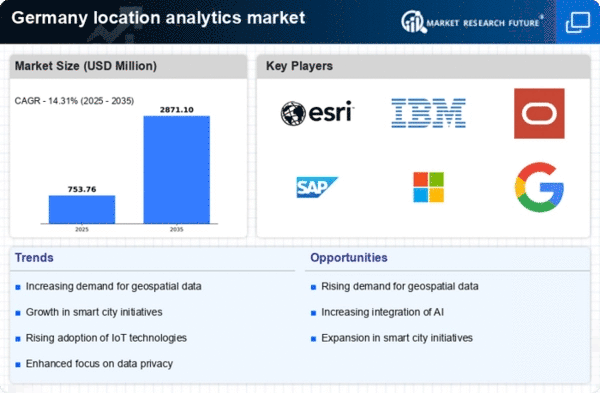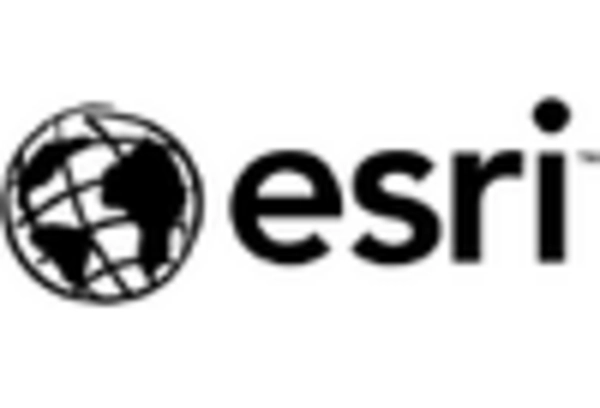Expansion of Smart City Initiatives
Germany's commitment to developing smart cities is influencing the location analytics market. With urbanization on the rise, local governments are investing in smart infrastructure that utilizes location data to improve public services and enhance the quality of life for residents. The German government has allocated over €1 billion towards smart city projects, which include transportation management, energy efficiency, and public safety enhancements. This investment is expected to drive the adoption of location analytics solutions, as municipalities seek to optimize resource allocation and improve urban planning. The integration of location analytics in smart city initiatives is likely to create new opportunities for vendors in the market, as demand for innovative solutions continues to grow.
Regulatory Compliance and Data Governance
The location analytics market in Germany is shaped by the increasing focus on regulatory compliance and data governance. With stringent data protection laws, such as the General Data Protection Regulation (GDPR), businesses are compelled to adopt location analytics solutions that ensure compliance while maximizing data utility. Approximately 75% of companies in Germany are prioritizing data governance frameworks to manage location data responsibly. This emphasis on compliance is driving the demand for location analytics tools that incorporate robust security features and data management capabilities. As organizations navigate the complexities of data regulations, the location analytics market is likely to see a rise in solutions that address these challenges.
Growing Demand for Real-Time Data Insights
The location analytics market in Germany is seeing a surge in demand for real-time data insights. Businesses across various sectors, including retail and logistics, are increasingly leveraging location-based data to enhance operational efficiency and customer engagement. According to recent studies, approximately 70% of organizations in Germany are prioritizing real-time analytics to make informed decisions. This trend is driven by the need for timely information to respond to market changes and consumer behavior. As a result, the location analytics market is projected to grow significantly, with an expected CAGR of 15% over the next five years. Companies are investing in advanced analytics tools that provide actionable insights, thereby fostering a competitive edge in the market.
Increased Adoption of Location-Based Marketing
The location analytics market in Germany is seeing an increase in the adoption of location-based marketing strategies. Businesses are recognizing the potential of geolocation data to target customers more effectively and personalize marketing campaigns. Recent surveys indicate that around 60% of marketers in Germany are utilizing location analytics to enhance customer engagement and drive sales. This trend is particularly prevalent in the retail sector, where companies are employing location data to optimize store placements and tailor promotions based on consumer behavior. As a result, the location analytics market is expected to expand, with an estimated growth rate of 12% annually as businesses seek to leverage data-driven marketing approaches.
Rising Importance of Supply Chain Optimization
Supply chain optimization is becoming increasingly critical for businesses in Germany, thereby impacting the location analytics market. Companies are utilizing location analytics to enhance logistics and distribution processes, aiming to reduce costs and improve delivery times. The logistics sector in Germany is projected to grow by 8% annually, driven by the need for efficient supply chain management. By integrating location data into their operations, businesses can identify optimal routes, monitor inventory levels, and respond swiftly to disruptions. This trend is likely to propel the demand for location analytics solutions, as organizations strive to achieve greater operational efficiency and customer satisfaction.
















